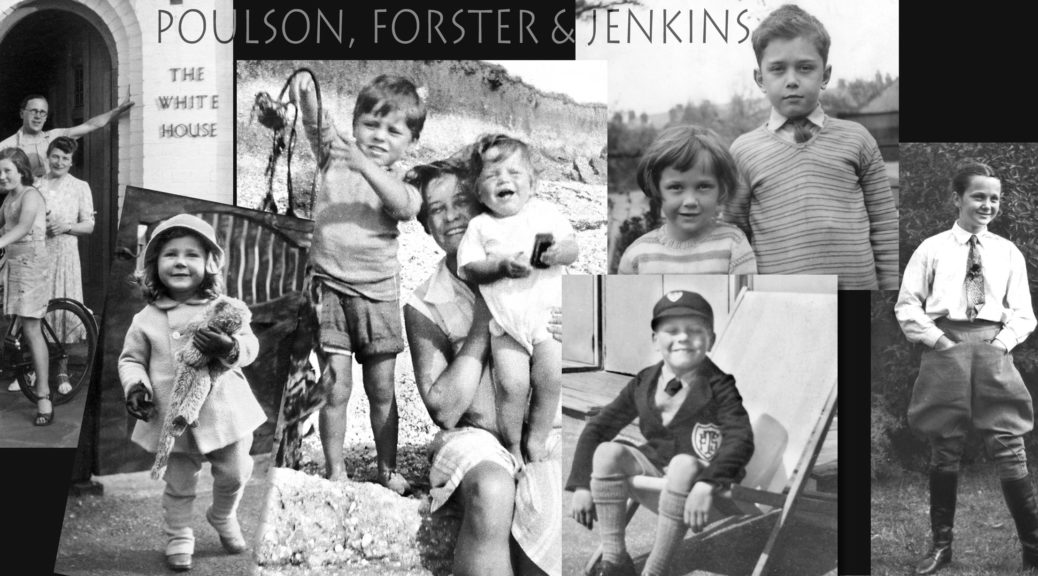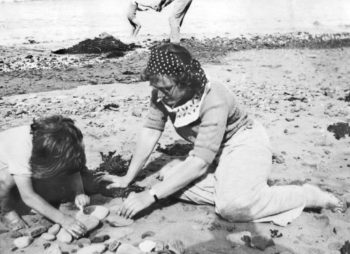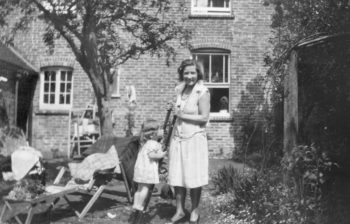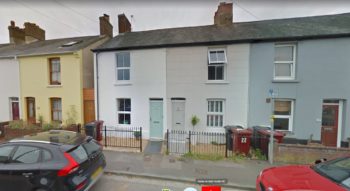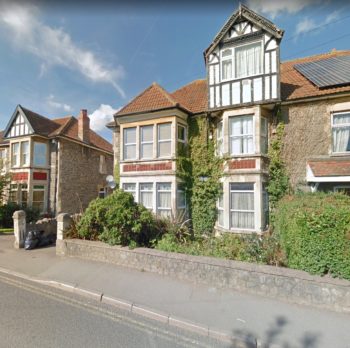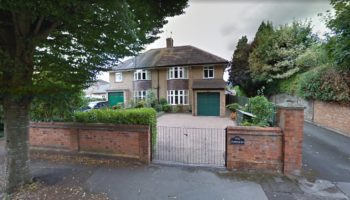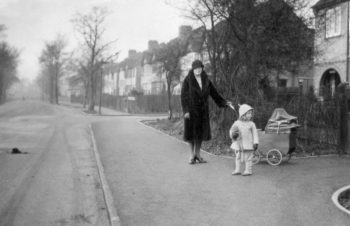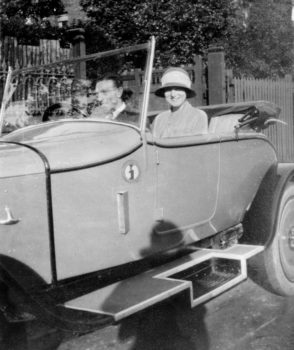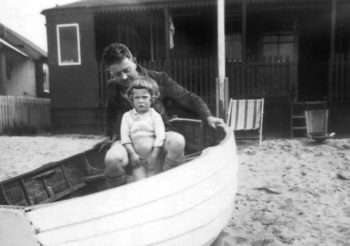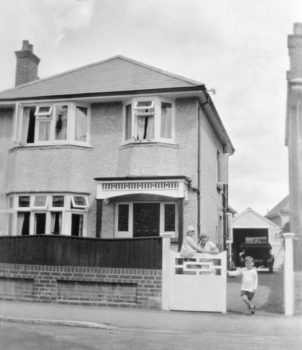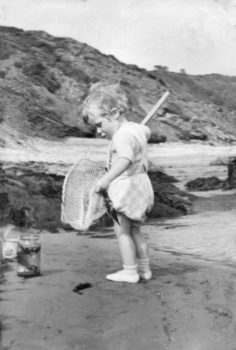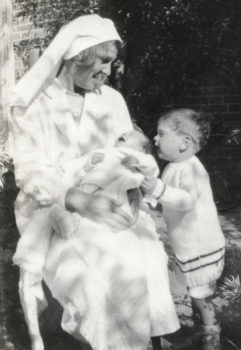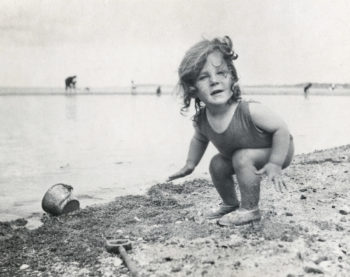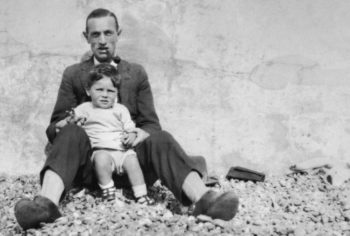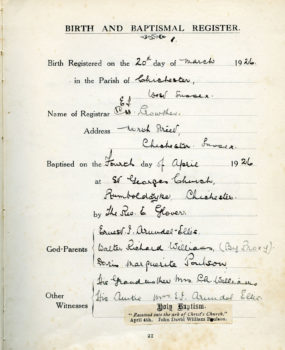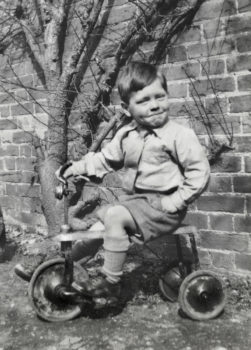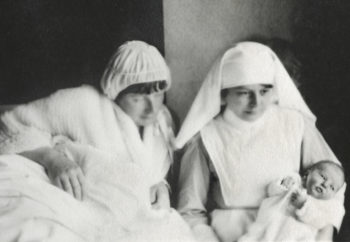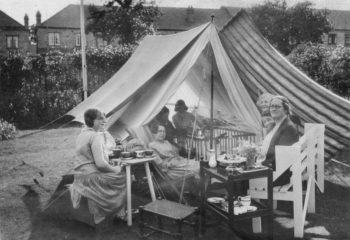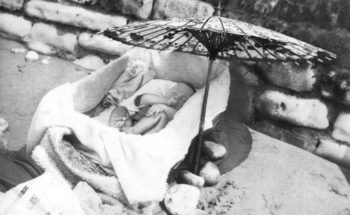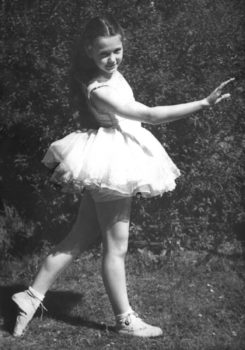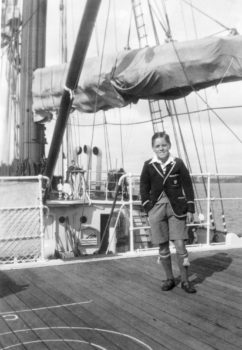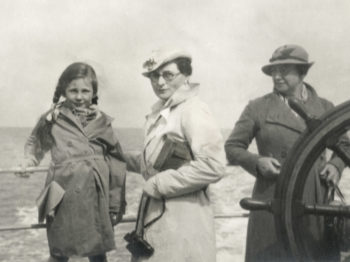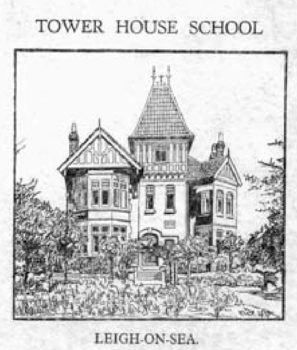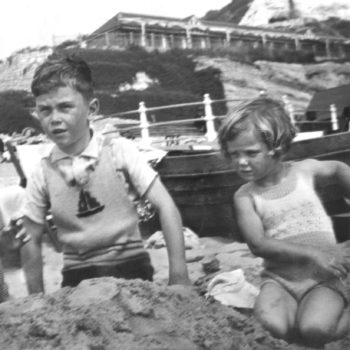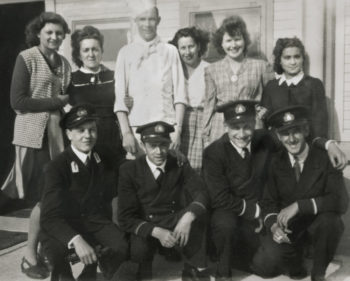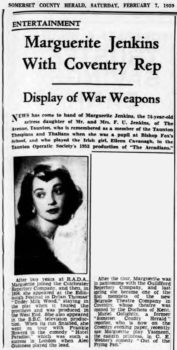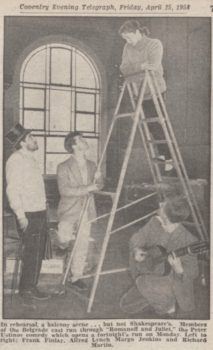This is part II of the story of four generations preceding me and my four brothers – our parents growing up between the wars in England and somehow all ending up in the theatre. For Yvonne and David, I have written recollections. Yvonne left many – some illustrated – diary-like notes and a book, Mind Boggled. David left a stack of notebooks filled with a scribbled draft of a memoir he never finished – to his credit, he numbered the pages, books, and various inserts – in his near-illegible writing. It’s mostly theatre name-dropping and “funny stories” but parts are about his early years. A characteristic blend of gauzy generalities of an idyllic childhood and tales of David’s excellent adventures. Old newspapers add details – of piano competitions, school prizes or sports matches – plus there are stories we heard from them growing up. David’s “Progress Book”, written by Billie, and a few notes in an album by Wynne are the only accounts from the grandparents directly. Margo’s brother Harding kindly provided some childhood stories for her. I’d like to offer a sense of where they lived, went to school, what home life was like, and to sketch out their path from babies to the adults we knew.
Our parent’s early childhood homes are still around, and Google Street View fills in for missing family photos. At left is the back garden of the grandly-named Boyne Lodge in Chichester, where both David and Jill were born. When I checked the address, 24 Whyke Lane, both street and aerial views (showing the long and narrow garden), I couldn’t imagine anything less lodge like. It is a small, plain house in a terrace of three, with a skinny garden fitting in a greenhouse and lots of space to play. The Winton house, shown a few paragraphs below, was their next home as Barclays Bank moved John Poulson from clerk to head clerk to manager. This was the best remembered childhood home. I think it’s the one he returned to years later and persuaded the current owner to allow him in to look around.
Margo was born in Hampstead Nursing Home (a hospital) in Brislington, near Bristol and her parents at the time lived with her three aunts at Heathbury in Keynsham. Derek’s architecture practice was operated from a room at the top of the house – during the depression, money was tight. After moving to a rented house on Clifford Avenue in Taunton when Derek joined the County Architect’s department, in 1937 the family moved into a new duplex on The Avenue near the center of Taunton. Margo stayed there until leaving for RADA in 1953, and the family stayed until Derek’s death in 1960. The name is now Fairhaven, but the Jenkins family called it Clarebury – blending Heathbury with Clarendon, Rose’s former home – Derek doing the honors by screwing metal letters to the gate.
Yvonne was born at home in a rather sterile-looking street in Chingford on Long Deacon Road and moved several times for schools or her Dad’s health. They moved to Leigh-on-Sea apparently for Yvonne to attend Tower House school (having tried a boarding school for her, briefly). The White House, on Ox Lane in Harpenden (seen in the collage at the top of the post) followed in early 1939, possibly driven by yet another change of school. They stayed put until Yvonne left for RADA in 1945. In looking at Google’s view of the top floor flat on Salisbury Road in Leigh-on-Sea, I realized that some of my mother’s photos were taken on the flat roof (which has some mesh fencing added but is otherwise largely unchanged). Her notes mention being in school plays at Tower House – in the group shot she’s the one in front of her mother waving a tambourine (no idea who the other kids are).
So much for where they lived. What were things like in middle class South of England while they were growing up? Our grandparents were born into an England with few cars, telephones rare in homes and no airplanes. As grandparents became parents, day-to-day life had changed a lot (beyond surviving World War I), although that England seems other-worldly to me. As an example, in the Portsmouth newspaper where David’s birth was announced on February 27, 1926, there was an article about wireless broadcasts – i.e. radio – and how often people “…trudged the streets of Portsmouth carrying their . . . batteries to garages and other charging stations.” However, Portsmouth was now “…splendidly served by enterprising firms who collect and deliver batteries on regular days of the week. This ensures a live battery being in the house at all times.” Modernity was a car with a self starter -a 1919 ad for Ford cars in the Dover paper had prices including “electric light and self starter” – the 1913 invention of a self starter replaced the crank handle (encouraging more women to drive). In 1923, the first wireless concert was heard on a train dining car courtesy of a “Marconi six-valve receiver.” Car radios started to appear as expensive extras in 1933 – Hillman noting “Wireless in the car is likely to be a very topical feature for the year ahead“. Television didn’t appear until after World War II, so wasn’t part of their childhoods. You can almost hear a “What will they think of next!” from the grandparent generation.
Harding mentioned heating in Clarebury – fires in the two downstairs rooms and electric heaters for the bedrooms, but even electricity nationwide was relatively new. In 1927, the “electrification” of Britain had the Central Electricity Board stringing wires across the Thames adding to their one thousand miles of transmission lines nationwide. That was also the year of the first talking picture (The Jazz Singer) and a car going over 200 miles per hour – Sir Henry Seagrave’s Sunbeam on Daytona Beach. Plane travel became commercially available by the time our parents were adults – I think David was the first to fly (when working for BOAC) – although Yvonne took until 1989 to get on a plane to fly to Boston for my wedding to Jeffrey.
The three families were not well off, but were comfortable. There was money for private school for Yvonne & David. This period between two World Wars and during a depression – the worst of which hit the industrial midlands and north – was manageable for the Poulsons, Forsters & Jenkins. There are no family stories about lost jobs although slow business led Derek Jenkins to move to the County Architect’s office in Taunton. The bank manager (John EL Poulson), the insurance underwriter (Leonard C Forster) and the architect (Frederick U Jenkins) kept the jobs they had when their children were born throughout their careers, offering stability. In John EL Poulson’s case, a huge contrast with his own childhood where both mother and stepmother (aunt) died young, his Dad left them and the family was split up.
Holidays were taken in England, not abroad. People could stay in touch by telephone but trunk calls were expensive and local calls kept short as you paid by the minute. In 1932 I found a phone book entry for Leonard C Forster, the earliest one for any of the families (based on records available on Ancestry). Society was progressing, but slowly. Boys had mostly the same education as girls; working women were less of a rarity in the middle class. Rose learned to drive (apparently never took a test as they weren’t required when she started), but Billie and Wynne never drove. They predated the pill generation, so worries about unplanned pregnancies were still very real – David was a father before he married Yvonne (Yvette in France, mentioned in the earlier blog post). British society was still very class conscious and Wynne particularly cared about status and appearances. David told me (as a teenager) that I couldn’t pierce my ears as it looked “common” and I recall Margo worrying about accents picked up at school and how they’d invisibly exclude the boys from jobs – so those themes must have been absorbed by all three parents.
Newborns with older stay-at-home Mums. David was born in 1926 in Chichester, Yvonne in 1929 in Chingford and Margo in Taunton in 1934. Margo had an older brother Harding (born in 1930). David and Yvonne were born at home (we were all born in hospitals). Nurse Nanny (aka Louisa Evans), shown at left, was a Poulson family “nurse” – probably not an RN – who was lent to John & Billy for a few months around the birth of their two children – David’s sister Jill was born in 1928. It sounds very grand to modern ears, but Wynne had a nurse too (seen in pictures; I assume hired).
In 1928, women over 21 gained the right to vote (first time it was only married women over 30) – when they were married, none of our grandmothers could vote. All the grandparents were careful with money, although David’s memoir mentions Billie going on shopping sprees (probably a function of mood swings). World War I was still a recent memory, and as they grew up, our parents lived through World War II and its aftermath (with varying degrees of awareness of what that meant, David being the only one to briefly join the Royal Navy). Rationing continued until 1954. Wynne had a kitchen cupboard with saved paper bags, foil and other wrappings; Len saved envelopes in a drawer; Rose used to smooth and fold wrapping paper to reuse for future presents. You didn’t waste; you saved up for things; clothes were handed down and socks darned. Central heating was not a thing.
John David William Poulson was always known as David. He was born in February 1926, almost 3 years after his parents, John & Billie (Lilian Melita Williams) married in Portsmouth, Hampshire. Billie was a month shy of 29 years old. On the Poulson side, family was either dead (both mothers and grandfather), far away in Yorkshire, Malaysia, Australia or estranged (the Wastrel). David never met his paternal grandfather and only found out about his death in 1941 from Goggie. John’s older sister Goggie (Doris Marguerite) to whom he was very close, became a favorite aunt – a nurse, single, and he stayed with her many times, such when his sister Jill was born in 1928.
David was baptized on April 4, 1926 in Chichester at a church about 4 minutes walk from the house, and the usual suspects were there – Aunty Goggie & Uncle Ernie (Sis’s husband) were two of the godparents and the third, Billie’s younger brother Dick (Walter Richard) was away in the military, so was by proxy. Sis was there, as was the “sourpuss” grandma, Billie’s mother Clara. This was a social formality rather than a spiritual conviction but there were notes about David attending Sunday school. I don’t recall any religious discussions from grandparents except for Yvonne’s mother who had converted to Catholicism and occasionally talked about it. As an adult, David was bitingly rude and dismissive about religion in general and organizations (like the C of E and the Roman Catholic church). Given his boarding school experiences, it’d be hard to imagine him having positive thoughts.
Goggie and Ernie were adored – he talked about them both quite a bit when reminiscing – so the social part of the Christening worked well. David’s cousin Betty (Sis & Ernie’s only child) was only four years older, and his younger sister Jill was born in 1928, so until the Poulsons moved to Bournemouth in June 1930 and the Ellises to Greenwich shortly afterwards, cricket and beach outings together happened fairly often. Billie kept a “Progress Book” for both children and there are some priceless comments about young David. By the end of his first year, she noted “Think he will have great patience, so methodical in his little doings & play. Quick temper.” At 3 years old, “Is very mischievous, can scale the garden wall & get to a neighbours. Quite a long drop on the other side but he doesn’t seem to mind.” and “Quick temper but easily turned. Most stubborn on occasions but vey sweet & sunny mainly.” His sister Jill was Christened at the same church in 1928 – Aunty Poul (Gamps’ oldest sister Emily Muriel) and Aunty Sis were her godparents. An exchange from March 1933 between the two is so him: Jill – “David, you mustn’t speak to me in that nasty tone of voice.”; David – “Oh shut up! Don’t talk like that to your elders and betters.” He was seven!
Yvonne Mary Forster was the only child of Len and Wynne Forster, born in July 1929, seven years after they were married at Stamford Hill Congregational Church in April 1922. Wynne was 31 years old. Yvonne said Len thought women shouldn’t be “baby factories”; Wynne told of her “fight” to have a baby and insinuated to Yvonne that Len wasn’t a “proper man”; David Poulson thought Len was a “latent homosexual” (nothing like a supportive family…) Len was often ill during the 1930s, apparently as a result of his burst appendix as a teen. Yvonne told of a car accident when she was two where she flew into the windscreen, cutting her head. She had been sitting in her mother’s lap when the car wheel got stuck in a tram line. Nothing I’ve read says why she was in hospital (versus just treated for her cuts) as a result, but she recalls terrors of being in a hospital without her parents and not recognizing her mother when she came home. It was standard (if insane) practice then to keep young children separated from their parents in hospital – one account told of two days a week with a couple of hours for parents to visit. I suspect that this accident loomed larger as an adult as she sought explanations for her mood swings, but it’s hard to know.
Yvonne wrote extensively, if pretty vaguely, about the tantrums and behavior problems she had that led her to being sent to a boarding Montessori school as a way to deal with her. Without any clear narrative of what happened – as opposed to how it all felt to Yvonne, which was a tale of emotional disturbance, blackouts and Wynne wanting to run off with the doctor who had “cured” Len – it seems that Wynne was manipulative, with notions of living through her beautiful, talented daughter. She was harshly critical and the frequent school moves and separation from “unsuitable” child friends left Yvonne retreating into books (more criticism if they were novels, of which Wynne did not approve!) and acting. Len generally didn’t intervene, but as an adult, Yvonne and he shared such laughs together – usually at Wynne’s expense – co-consipirators in thwarting her attempts to control things. All the photo albums from Yvonne’s early years seem very stiff and formal when compared to those of David or Margo.
Marguerite Roseanne Jenkins was the second child of Derek and Rose Jenkins, born in December 1934 at a hospital in Brislington – Rose was 35 years old. For most of her childhood the family lived on The Avenue in Taunton, and in the 1939 register, a stenographer lived with the family – not a relative, so I assume this was just a way to help pay bills. Clarebury had been built on an old orchard and the back garden had apple and pear trees. Margo started dancing lessons at Miss Marjorie Newman’s School of Dancing with Rose playing the piano to offset some of the cost. Both Rose and Derek were members of the Taunton Amateur Orchestra which played for the Taunton Operatic Society. The Taunton Thespians put on three plays a year until the start of the war, and the junior group, the Thalians, was where Margo started performing. Newspaper accounts of school prizes and Taunton Music Festival awards appeared in the local paper, starting in 1946 (when she won the under 13 piano competition).
It appears that Margo took advantage of every opportunity to sing, dance, play or act. When a wartime canteen run by Taunton Toc H was closing in April 1946, entertainment was provided by a violinist and a group of dancers, including Marguerite Jenkins. A fundraiser for the Taunton Hospital and St. Barnardo’s Homes had dancing by her ballet school and the paper said “My Lady’s Jewel’s” was the best of the program (Margo was a ruby!). The paper reported several years of awards for “Pianoforte” in the Taunton & Somerset Music and Drama Festival – no reviews, just the scores.
Margo did many productions with the Taunton Thespians, both performing and in some cases helping backstage – as a “call girl” in 1949 and roping Harding in for lighting on another production. In 1947, the Taunton Courier noted “…Marguerite Jenkins will be speaking up for the rising generation as Sally Spender” in “A Quiet Weekend”. In 1949, there was even an award for a poster she did for a Taunton Youth Hobbies festival – I don’t remember ever seeing any drawing or other visual art/design work from Margo, so I assume other things crowded this out!
Overall, the impression this creates is of lots of classes and activities with many local groups – that the family was actively involved in the local community. The Mountway School of Dancing for ballet, piano lessons at home from Rose (I assume) and acting with the Taunton Thespians. It certainly fits with the woman I knew who couldn’t just sit and watch television – she’d knit so she was “doing something”.
Schools. In 1918, the school leaving age was raised to 14! I expect our grandparents planned for their children to take School Certificate and Higher School Certificate (precursor to O and A levels, which preceded GCSE) rather than leave as soon as possible. Two parents spent parts of their childhood at boarding school (David & Yvonne). For both, it was the very young age at which they went that struck me as sad – Yvonne was six and David was seven. Around the time my oldest was the age Yvonne & David went away to school I had conversations with them both about boarding school. I told Dad I thought it was barbaric to send a child away to school at age 7 and he replied that was “what one did” at the time, and told a funny story about being sent home from his first (day) school because he repeated a swear word he’d heard his father use. He tended to see life experiences as source material for funny stories. Boarding school did foster independence at an early age – in 1938, 12-year old David went to France for the summer on the SS Bremen to stay with a French family, M. & Mme Mabire, in Bayeux to learn French. His father had a plan to have him learn several languages as preparation for the diplomatic service. War interrupted the program.
When I read David’s memoir notes describing two abusive headmasters at Holmwood Park – the first who liked to be taken out at night, tied to a tree and beaten by the senior boys, the second who liked to spank boys’ bare bottoms (corporal punishment that got personal) – boarding school seemed an even worse idea. I found a newspaper story regarding the conviction & imprisonment of the second headmaster, confirming part of David’s recollections. David won a scholarship to his next boarding school in 1939, St. Edward’s, Oxford, which his stories depict as an even more brutal environment. He always talked about all the doors it opened for him as it was a “name” public school – I think a minor one – but I can’t see anything positive in being able to name-drop but seeing some of the worst of people at such a young age.
Yvonne replied to a question about boarding schools saying she remembered thinking David’s sounded barbaric and explained his “hang-ups”, noting it had once had a status it no longer did:
“I never thought of mine like that because Montessori was child centred and I’d never had such a good time. I had space, a huge garden with sandpit, swings, trees to climb, and I learned to ride a bike. I had done all the things they did in class years ago so that was boring, but I enjoyed watching other children, they seemed a strange race. I preferred to play alone most of the time. Elspet Gray (actress) was my sparring partner over time on the bike. We set the tables and served the food. That made me feel very important. I just remember feeling very lonely on a few occasions when the cock crowed very early. But it wasn’t a sense of loss, just a feeling I wasn’t going anywhere like being on a magic island. I did miss the music and my kind of books: and I still got tongue tied with other kids, like I didn’t speak the same language. We had children’s music though.”
After the Montessori boarding school, Yvonne was sent to Tower House school in Leigh-on-Sea (as a day pupil). This drawing is from an old school prospectus provided by a former pupil who described a private school for children 4-11 with “modern” ideas, music, elocution and annual school plays. School hours were apparently 9-12 and 2-4, so it’s good that the Forster’s house was so close. The next move for Yvonne was to Harpenden where she attended a local co-ed school which Yvonne enjoyed and which had an Art Hut where she could draw and paint (Wynne apparently frequently criticizing the accuracy of her drawings). Yvonne’s written work and math wasn’t great, and when the school advised Wynne to let the child go at her own pace, Wynne removed her and Yvonne went to St. Alban’s Church of England grammar school, which she hated. She took School Certificate in 1944 but asked for an audition for RADA, which gave her a place – Wynne’s dreams of Yvonne going to Oxford or becoming a doctor were not to be.
Margo went to Bishop Fox’s Grammar School for Girls in Taunton where local newspaper articles give some idea of her time there. She received a “Good Progress” prize in 1946 and 1947, and was on the prize list for year III (not sure for what) in 1948 – she was clearly a good student.
Margo’s school plays included Orpheus in March 1950, where she played Euridice “Euridice was played by Marguerite Jenkins. Her singing, though lacking spirit at the beginning, later came near to the standard of that of Orpheus, and her acting In the Elysium scene when Orpheus came to take her away, was the most notable feature of her performance.” In December 1950, they put on The Fantasticks and of Margo’s performance, the Taunton Courier said: “Marguerite Jenkins, as the vivacious Sylvette, showed that she has the makings of a first-rate character actress, she has a clear pleasant voice and knows how to get on good terms with an audience This came out in her asides. Instead of talking at the audience she talked to it; and to do this she used an all-conquering personality.”
After secondary school. David left St. Edwards in 1942 and intended to enter the Royal Navy on his 17th birthday – in February 1943. He apparently passed an initial physical, reported for training at the HMS Royal Arthur in Skegness (a Butlins holiday camp turned into Navy training during the war), but was told he couldn’t remain in the Navy following a failed eye test. His father had a contact at BOAC in London, sent Dad for an interview and he became a Station Assistant with them until around 1948. He never attended drama school, but learned on the job (as a lark doing a play in Khartoum while still with BOAC, then doing auditions in London where he was told to go learn the trade in weekly rep).
Yvonne attended RADA from 1945 -1947 and described herself as without star quality, a character actress at 17, and wondering if she was there for more than to escape “...a dotty lot of teachers.” She found competition stiff and fear of failing prompted her to make an effort which resulted in her diploma in 1947 and the Gertrude Lawrence Prize for the best performance in a character part. She played several Shakespeare plays in Regent’s Park, and a fringe production where she met Maxine Audley and her then-current husband, the pianist Leonard Cassini (briefly Yvonne’s boyfriend). When Len left for a concert tour of Europe, Yvonne started in weekly rep which is where she met David who she described as “…a charming stage manager” and after a too short (her words) 3 months together, they were married in July 1950.
Margo left Bishop Fox in the summer of 1953 and started at RADA in September. She must have auditioned in London, but although the local papers tracked her progress I could not find an article about her auditions or winning a place. At the end of her two years at RADA The Stage covered the student matinee and noted “Marguerite Jenkins was awarded Lord Lurgan’s prize for grace and charm of movement and speech.” In June, RADA students performed at The Dome in Brighton and the Worthing Times had this to say: “As all the young students from the Academy of Dramatic Art were so good it would be invidious to mention any particular member, but I thought Titania (Queen of the Fairies) spoken by Marguerite Jenkins, and Oberon (King of the Fairies), Peter Needham, were quite outstanding“. The article from the local paper at left has a good summary of the work she did in the following couple of years (and as she was known professionally as Margo Jenkins starting in 1956, I think this information was given to the Taunton paper by family).
Margo’s time in Coventry (1958-9) was with a new company in a brand new theatre. In addition to reviews in the Coventry paper of the Belgrade Theatre Company’s productions, there were other projects that mentioned Margo’s participation. She opened a local association’s field day and was a judge of the Miss Holbrook contest. She and others from the company entertained at an old person’s club. She was a bridesmaid when two members of the company were married. The company did special Sunday evening sketch comedy revues for Theatre Club members. With a few exceptions, reviews were very positive. Margo’s work took her to the New Theatre, Bromley in January 1960, run by Peter Goss and David Poulson.
The early 1960s was a really crazy time for David, Margo & Yvonne. The fact that two of the three of them were also dealing with the mood swings of bi-polar disorder didn’t help. In December 1960, Margo’s father, Derek, died. In January 1961, David left Yvonne and their three children. At the end of May 1961 Yvonne fell from an attic window and spent a year in Stoke Mandeville Hospital spinal unit. In December 1961, David’s mother Billie died, David finding out how only on arrival at Salisbury train station. The newspaper headline greeting him was “Bank manager’s wife commits suicide”. David and his father never talked about Billie’s death – I asked Dad why and he said if Gamps wanted to talk about it, he’d have brought it up. I suggested that wouldn’t work if Gamps was assuming the same thing about him. In July 1962, the recently widowed John Poulson married Billie’s friend and their next-door neighbor Dorothy Trevor-Roper. Yvonne filed for divorce in 1963 (she said she didn’t want to, but that David threatened to take me out of the private school I was attending if she didn’t). The divorce was final in September 1965 and in January 1966 Margo and David were married.
Perhaps this explains why big family get togethers didn’t happen when we were kids. Two grandparents were dead. Dorothy tolerated childen (she didn’t have kids) but wasn’t thrilled to have us there. Wynne had always loathed David, so her nasty comments about both him and Margo throughout our childhood visits there weren’t surprising. She could never bring herself to refer to Antony & Michael as our brothers “How are your little half-brothers” still rankles even today. Rose was always full of energy and was for a while a live-in parent surrogate for the older three of us (along with a young actress who was a single mother). She was a truly terrible cook but a very kind get-on-with-things person who mothered the older three of us without reservations and was (lovingly) christened Batty Nan by the younger two. Yvonne and Margo managed to work together as needed for us kids – David just fled whenever they were both together saying it was crazy to have two wives in the same house. Kudos to the two women for doing the heavy lifting!

